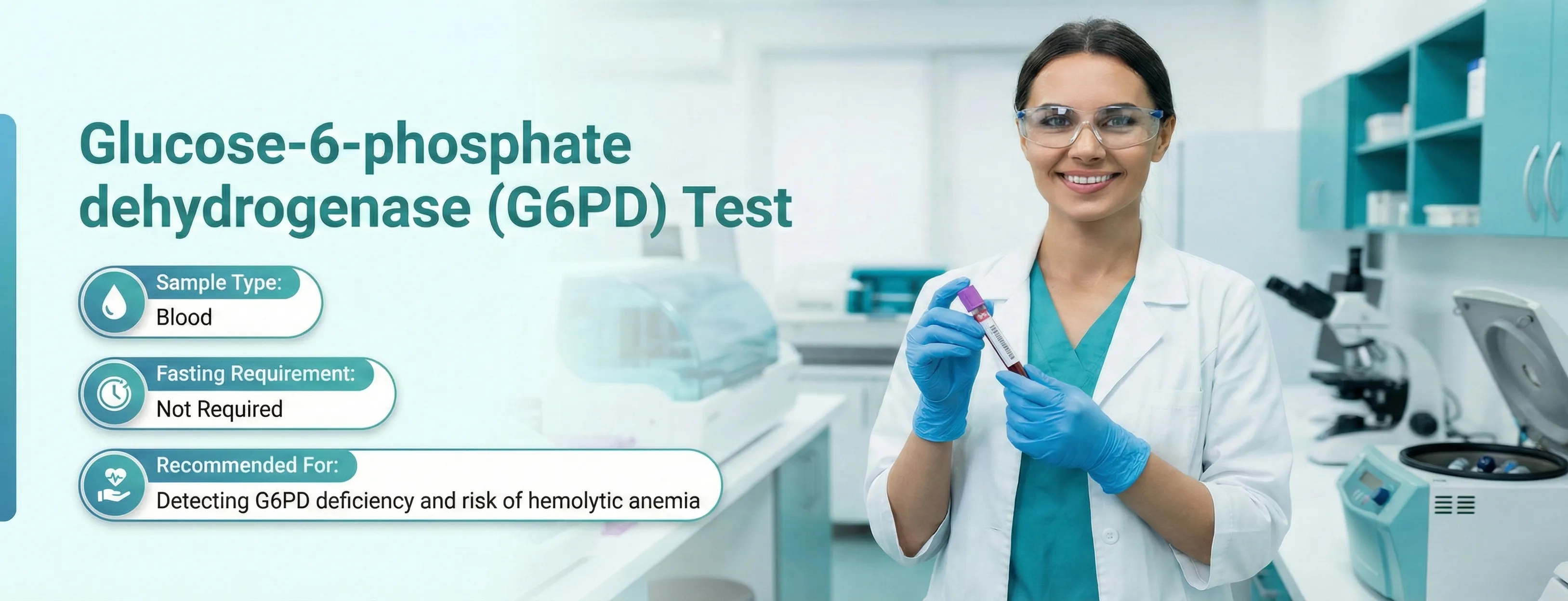39+ orders placed in your location
100% NABL & ISO Certified Lab • 100% Accurate Reports
Glucose-6-phosphate dehydrogenase (G6PD) Test
G-6-PD test, RBC G6PD test
- SummaryThe Glucose-6-Phosphate Dehydrogenase (G6PD) Test measures the level of the G6PD enzyme in your blood, which is essential for red blood cell function. A deficiency of this enzyme can lead to hemolytic anaemia. This test is usually recommended for individuals with unexplained anaemia or a family history of G6PD deficiency. It requires a blood sample and does not require fasting.Read more
- Reports Within16 HrsView Sample Report100% NABL & ISO Certified Labs
- SampleBlood
- AgeAll Age Group
- GenderMale and Female
- FastingNot Required
PharmEasy Promises
Know More About The Test
A quick info on Glucose-6-phosphate dehydrogenase (G6PD) Test
Overview
The glucose-6-phosphate dehydrogenase enzyme is essential for keeping your red blood cells intact. An enzyme is a chemical compound that regulates different biochemical processes and reactions in your body. The G6PD enzyme ensures that the red blood cells (RBCs) present in your body function to their optimum capacity and live an expected lifespan. The enzyme also protects the red cells from unwanted substances in your blood that can harm the RBCs.
When red blood cells are deficient in glucose-6-phosphate dehydrogenase enzyme, they start to break down prematurely. This is called hemolysis. When too many red blood cells break down, a person can develop hemolytic anaemia, which can cause further complications like jaundice and even death in certain cases. Red blood cells with insufficient G6PD enzymes are sensitive to certain things that can trigger their destruction.
Not having enough glucose-6-phosphate dehydrogenase enzyme is an inherited disorder, called G6PD deficiency. This disorder often affects males and results in the red blood cells not being able to make enough G6PD. Sometimes the cells produce the enzyme, but it doesn't work the way it should.
The glucose-6-phosphate dehydrogenase test measures the level of the G6PD enzyme in the blood. Doctors prescribe the G6PD test to people who display symptoms, such as pale skin, jaundice, rapid heart rate, shortness of breath, dark or yellow urine, etc. The results of the G6PD test help in the diagnosis of hemolytic anaemia or other G6PD deficiencies.
G6PD deficiency affects nearly 400 million people worldwide. It was noticed that the enzyme has more than one form (polymorphic) in areas with malaria prevalence. The prevalence of G6PD deficiency varies from 2.3% to 27.0%, with an overall majority of 7.7% in different tribal groups of India. Since most of the tribal groups live in areas where malaria is prevalent, using antimalarial drugs irrationally can increase the cases of drug-induced hemolysis.
Other names of glucose-6-phosphate dehydrogenase test
- G6PD deficiency test
- Glucose-6-phosphate dehydrogenase test
- G-6-PD
- RBC G6PD test
What does the glucose-6-phosphate dehydrogenase test measure and who is it prescribed to?
The glucose-6-phosphate dehydrogenase test measures the levels of G6PD enzyme present in your blood. Doctors prescribe the G6PD test in case a patient displays the following signs -
- Pale skin
- Extreme fatigue
- Dizziness
- Confusion
- Fast heartbeat
- Rapid breathing
- Shortness of breath
- Jaundice (yellowing of skin and eye)
- Enlarged spleen
- Fainting
- Red or brown urine
- Belly or back pain
A newborn baby with a G6PD deficiency can be born with jaundice. Your doctor may order a glucose-6-phosphate dehydrogenase test if other reasons can not explain the baby's jaundice and if it has persisted for more than two weeks. A baby may also display symptoms, such as dark urine, increased bilirubin levels, pale stools, etc. Your baby may also be tested if you have a family history of G6PD deficiencies.
Doctors may prescribe the glucose-6-phosphate dehydrogenase test to people who have unexplained episodes of hemolytic anaemia, dark urine or jaundice. People who have had recent viral infections or have been exposed to triggers such as fava beans or sulpha drugs and have faced a subsequent hemolytic episode can also get tested for G6PD deficiencies.
The results of the glucose-6-phosphate dehydrogenase test can help in the diagnosis of the following health conditions -
- G6PD deficiency
- Hemolytic anaemia
The glucose-6-phosphate dehydrogenase test does not evaluate the functioning of any organ or the lifespan of your red blood cells. It only estimates if your RBCs have optimal levels of the glucose-6-phosphate dehydrogenase enzyme that will enable them to function correctly.
Sample Type
The result of a G6PD deficiency test is evaluated through a blood sample and analysing the levels of glucose-6-phosphate dehydrogenase enzyme present in the blood.
Test Preparation
The glucose-6-phosphate dehydrogenase test is relatively simple and does not require any preparation. Your nurse or clinician will use an antiseptic swab to clean the area before the test. They'll wrap an elastic cord around your arm so that your veins become more visible.
Later, the clinician will use a small needle to draw several samples of blood from your arm. They will place a small bandage to stop bleeding and your samples will be sent to the lab for testing. Some medications can interfere with your test results. Talk to your doctor about any drugs that you are taking.
Your doctor may advise you to stop taking a particular medication before the G6PD test. A recent blood transfusion can interfere with the results of the G6PD test. Talk to your doctor if you have taken drugs, including antibacterials, antifungals, water pills or anticonvulsants. These drugs are called sulfa drugs and can produce adverse reactions in people with G6PD deficiency.
If you have recently experienced a hemolytic episode, your G6PD test will be delayed. Several cells with low levels of glucose-6-phosphate dehydrogenase enzyme are destroyed during a hemolytic attack. Hence, the results of the G6PD test can be misleading.
Test inclusions: What parameters are included?
The glucose-6-phosphate dehydrogenase test evaluates one parameter: the value of the G6PD enzyme in the blood. G6PD deficiency is a genetic disorder, which is more common in men. Patients who have inherited the disease are prone to experiencing significant changes in the outer layer of their red blood cells when they get exposed to particular triggers, such as stress, infections, drugs, etc.
Due to these changes, the RBCs break apart rapidly and cause a decline in the number of red blood cells. If the body is not able to replenish the destroyed RBCs, patients can suffer from hemolytic anaemia.
How frequently should you take this test?
The glucose-6-phosphate dehydrogenase test is ordered when a doctor suspects the possibility of G6PD deficiencies. Your healthcare provider will recommend a G6PD test in case you display signs of hemolytic anaemia. The G6PD test is also ordered for newborn babies who have had jaundice for more than two weeks.
In case you have a family history of glucose-6-phosphate dehydrogenase deficiency, your doctor will order you to take the test. If you are diagnosed with G6PD deficiency, your doctor may occasionally ask you to repeat the test, depending on your prognosis. The frequency of the test depends on your doctor's decision and treatment plan.
Risk Assessment
Inherited glucose-6-phosphate deficiencies
Ranges
Status | Value |
Normal | 5.5 to 20.5 units/gram of haemoglobin |
Severe deficiency | Less than 10% of the normal value |
Moderate deficiency | 10% to 60% of the normal range |
People with less than 10% of the normal range may have chronic hemolytic anaemia. Other patients with severe deficiency of the glucose-6-phosphate dehydrogenase enzyme may not have chronic hemolytic anaemia but may suffer from intermittent anaemia. Patients with moderate enzyme deficiency may have intermittent hemolytic anaemia that is often associated with certain medications or infections.
Test Result Interpretation
If the test results of your G6PD test show low levels of the enzyme, that indicates a G6PD deficiency. Your doctor will analyse your enzyme levels and reach a final diagnosis to determine the severity of your condition. The G6PD test can not be used to predict how an affected patient will react when exposed to particular triggers. The severity of the symptoms varies from person to person and can change according to different episodes.
An average G6PD enzyme level indicates that you are unlikely to have an enzyme deficiency and if present, the anaemia stems from a different cause. If your test was performed after a hemolytic episode, your doctor might ask you to repeat the test after a few weeks when the red blood cells have had time to replenish.
If you are diagnosed with G6PD deficiency, you will be asked to stay away from some drugs that can act as triggers, such as antimalarials, sulphonamides, aspirin, and nonsteroidal anti-inflammatory medications.
Was This Test Information Helpful?
Please rate your experience
References
People Also Ask
What food can a patient with G6PD not eat?
What triggers G6PD?
Is Vitamin C bad for G6PD?
What medicine should G6PD avoid?
Can G6PD be cured?
Have any doubts? Ask us.
Ask us anything about the Glucose-6-phosphate dehydrogenase (G6PD) Test to understand it better
We provide trusted, expert-curated health content to support better awareness,prevention, and care.
Backed by experienced doctors, medical experts, and strict editorial standards.


